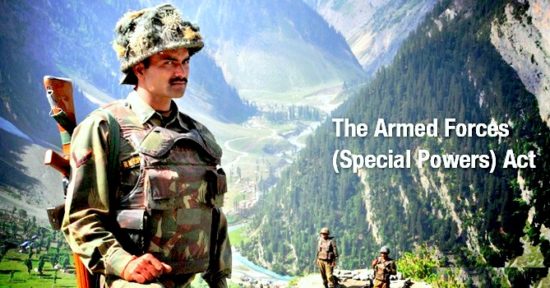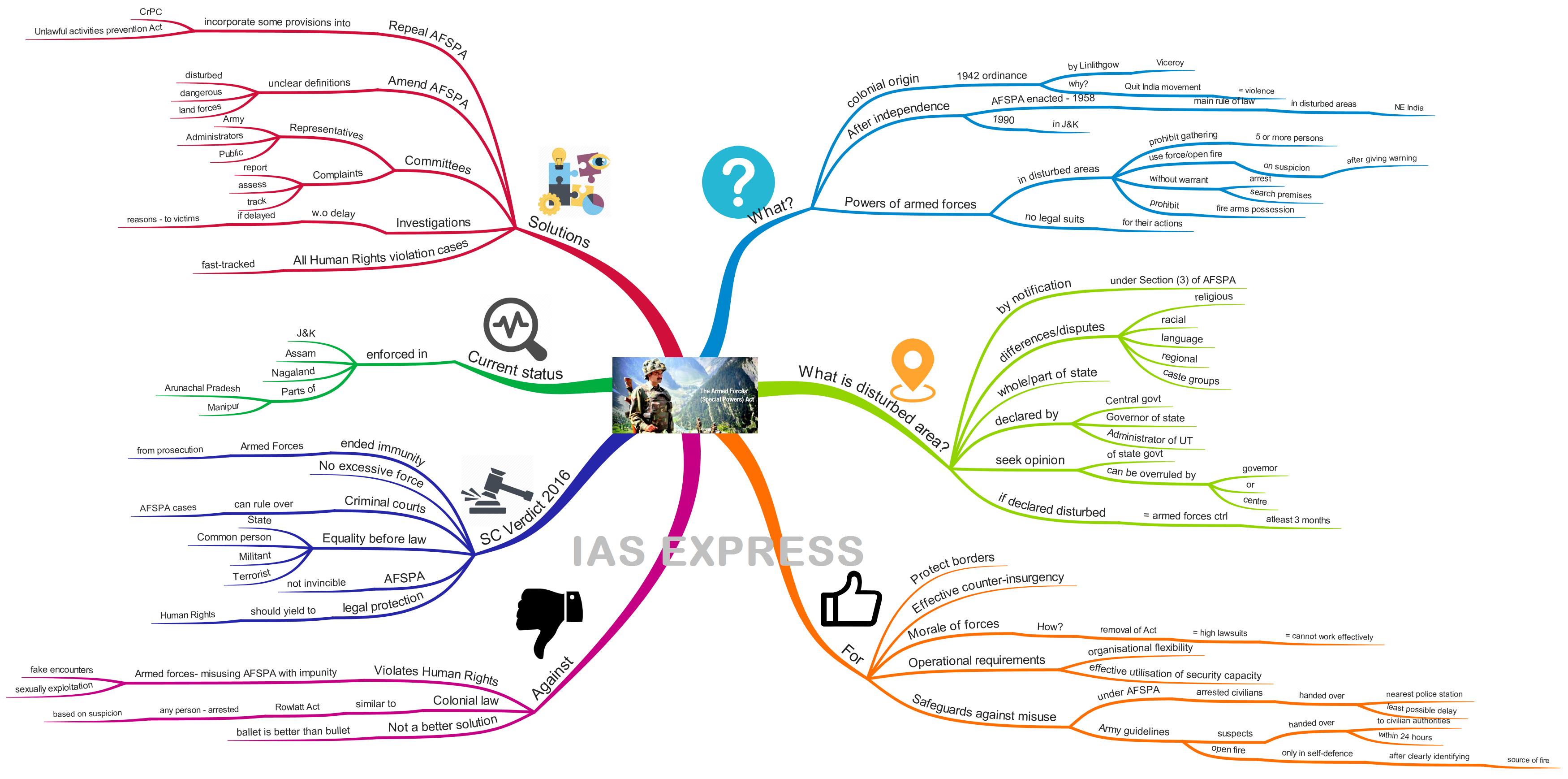Armed Forces (Special Powers) Act (AFSPA) – The Debate on Security Vs Human Rights

From Current Affairs Notes for UPSC » Editorials & In-depths » This topic
IAS EXPRESS Vs UPSC Prelims 2024: 85+ questions reflected
The Government of Assam in the exercise of powers granted by Section 3 of the Armed Forces (Special Powers) Act, 1958 has announced the whole State of Assam as a “Disturbed Area” for six months with effect from August 28, 2021, except withdrawn earlier. Though the statement did not specify any reason for the extension of the AFSPA in the state. Here’s what the act is all about:
What is the Armed Forces Special Powers Act (AFSPA)?
- AFSPA like many other controversial laws is of a colonial origin. The AFSPA was first enacted in 1942 as an ordinance by the then viceroy Linlithgow in the wake of the massive scale of violence across the country stirred by Quit India Movement launched by Mahatma Gandhi.
- After independence, the AFSPA was enacted in 1958 to help the army maintain the rule of law or public order in the “disturbed areas” of North East India.
- AFSPA was then implemented in J&K due to the surge in the insurgency in 1990.
- Under this law, the armed forces have the power to prohibit the gathering of 5 or more individuals in an area.
- In some cases, the forces can use force or even open fire after giving a due warning if they feel a person is in contravention of the law.
- If there is a reasonable suspicion, then the army can also arrest a person without a warrant, enter or search premises without a warrant, and prohibit the possession of firearms.
- Legal action cannot be taken against the armed forces even in case of any wrongful action.
What is a disturbed area and who has the power to declare it?
- A disturbed area is declared by means of a notification under Section (3) of the AFSPA.
- An area can be considered disturbed if there are differences or disputes between different religious, racial, language, regional or caste groups.
- A whole or part of the state or union territory can be declared as a disturbed area by the Central Government, the Governor of the State or the Administrator of the Union Territory.
- As per Section (3) of the AFSPA, it is mandatory to seek the opinion of the state government that whether an area is disturbed or not. However, the state government’s opinion can be overruled by the governor or the centre.
- If an area is declared as the disturbed area, then it will be under the control of the armed forces for at least 3 months.
What are the arguments in favour of AFSPA? (by armed forces)
- Protect borders: With the powers given by AFSPA, the armed forces have been able to protect the borders of the country for decades.
- Effective Counter-insurgency: A strict law is needed to tackle the insurgent elements inside the country particularly in the Kashmir and northeastern region.
- Morale of forces: AFSPA boosts the morale (mental well-being) of the armed forces for ensuring the public order in the disturbed areas as removal of the Act would lead to militants motivating locals to file lawsuits against the army.
- Operational requirements: Absence of such a legal statute would adversely affect organisational flexibility and the utilisation of the security capacity of the state = armed forces cannot fulfill their assigned role.
- There are adequate safeguards provided by the Act and the Army’s guidelines as follows-
- Section 5 of the Act mandates that arrested civilians should be handed to the nearest police station with a ‘least possible delay’ in addition to a ‘report of circumstances that led to the arrest’.
- Army HQ has also mandated that all suspects who are arrested will be handed over to civilian authorities within 24 hours.
- According to the army’s guidelines, a fire may be opened in towns and villages only in self-defence and that too when the source of terrorist or militant fire can be clearly identified.
What are the arguments against AFSPA?
- Violates Human Rights: There are several instances where the armed forces have found to be misusing the oppressive powers given by the Act like fake encounters, sexually exploiting the women in the disturbed areas. What’s more disturbing is the fact that the armed forces escape with impunity for their actions since legal suits cannot be filed against them as per the Act. Thus AFSPA clearly violates human rights.
- Colonial-era law: AFSPA is generally compared to the Rowlatt Act of the British regime because just like the Rowlatt Act, any suspicious person can be arrested only based on doubt in the AFSPA also.
- Not a better solution: Critics assert that there is no need to run the nation on the basis of the bullet while the issue could be addressed on the basis of the ballet (election).
What is the Supreme Court’s verdict on AFSPA?
- On July 8, 2016, in a landmark ruling, The Supreme Court of India ended the immunity of the armed forces from prosecution under AFSPA as follows:
- No excessive force: Army and paramilitary forces cannot use excessive and retaliatory force during counter-insurgency operations in areas declared as disturbed under the AFSPA.
- Criminal courts have the jurisdiction: over cases of alleged excesses by security forces which earlier were under a blanket of immunity provided by AFSPA.
- Equality before law: Court said it does not matter whether the victim was a common person or a militant or a terrorist, nor does it matter whether the aggressor was a common person or the state. The law is the same for both and is equally applicable to both.
- AFSPA is not invincible: The provisions of the Armed Forces (Special Powers) Act and the purported immunity it offers to the use of force “even to the extent of causing death” are not invincible.
- Preservation of rule of law: Such legal protection has to yield to larger principles of human rights, and the use of excessive or retaliatory force should be thoroughly inquired. This is essential for both democracy and the rule of law in the country.
What is the present status of AFSPA?
- Currently, AFSPA is enforced in J&K, Assam, Nagaland, and parts of Arunachal Pradesh and Manipur.
- The law has been repealed where insurgencies have decreased and when governments have attained confidence in managing the region using their own police force.
- The centre had removed AFSPA from Tripura and Meghalaya in 2015 and 2018 respectively.
- The centre also partially withdrawn AFSPA from Arunachal Pradesh.
What are the solutions?
- Repeal AFSPA: Jeevan Reddy Committee suggested the repeal of AFSPA and incorporate some of its provisions into other laws like CrPC, unlawful activities prevention act which provides protection to forces.
- Amend AFSPA: The lacunae in the Act, as a result of unclear definitions like “disturbed“, “dangerous“and “land forces” need to be amended to ensure greater clarity.
- Establish committees: at the district level with representatives of the army, administrators, and the public which will report, assess and track complaints in that area.
- No delay: All investigations should be done without delay and if there is a delay, the reasons for the same must be communicated with the victims. Furthermore, all cases of human rights violation should be fast-tracked.
AFSPA could not achieve its desired objectives even after 60 years of its enforcement. One can never tolerate human rights violation committed in the name of AFSPA, so the government needs to bring a scientific and humanitarian approach towards solving the socio-economic problems of the disturbed areas rather than implementing the oppressive Act.
If you like this post, please share your feedback in the comments section below so that we will upload more posts like this.



Very well explained.Great effort.Keep doing the good work💜💜💜
Great work
Thank You for all your hardwork on this.
thank you
Well explained 💜 Thankyou